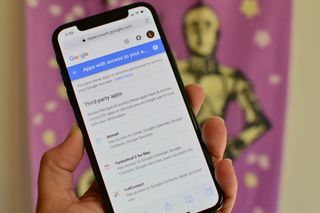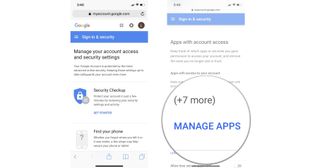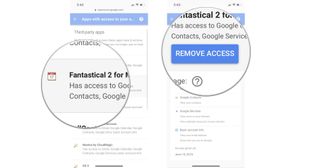
Google helps app and game makers with a single sign-on service similar to Facebook. Google has much stricter privacy policies about what third-party developers can do with your data, but it's still a good idea to clear out any apps or games you no longer use. Take a look at what apps you've given permission to and revoke access to ones you no longer use. Here's how.
- What the different app permissions are
- How to revoke third-party app permissions for your Google account
- What happens when you revoke access to your Google account for third-party apps
What the different app permissions are
Google allows developers to request three levels of information, basic, read and write, and full access. Each tier offers deeper access. For some apps, it's necessary (like being able to add an event to your Google calendar), while others shouldn't be asking for anything more than your basic information (your name and email address for single sign-on purposes). When you view the apps that you've given permission to, what they can do will be listed next to them.
Full account access
This gives the developer complete access to your Google account, including the ability to change your password, delete your account, send money through Google Pay, view all of your Google account activity, including web searches and things you've watched on YouTube, and a whole lot more.
Basically, you should never give full account access to any third-party app. You should only see this permission for Google apps. It's too dangerous to give that kind of power to a third-party app. None of them should need it and none of them should ask for it.
Read and write access
Read and write access is how some apps access limited features of your Google account. A third-party email app might have access to read, send, and delete your Gmail emails. You shouldn't be scared of this if you trust the company providing the service. I've given read and write permission to a handful of email clients that I trust.
This also works for calendar apps, which might request permission to manage your Google Calendar and create task lists for you, contact management apps, which have access to your Google contacts, or note-taking apps that have access to Google Drive.
If you trust the company, allowing them read and write access is not dangerous. It's useful, and in many cases, necessary to provide you the service you're looking for.
Master your iPhone in minutes
iMore offers spot-on advice and guidance from our team of experts, with decades of Apple device experience to lean on. Learn more with iMore!
Basic Information
When a developer asks for your basic information only, they're just connecting you to the Google sign-on feature, which includes your email address and name. It's not totally clear what else is included in the basic information permission, but your Google personal info page shows what basic information you share with your contacts, like your age and gender identity.
Some apps and practically all games should only be asking for basic information. If a game is asking for read and write permission, you should definitely do some digging to find out why the developer needs more than that.
How to revoke third-party app permissions for your Google account
It's a fairly simple process, and you should probably check your app permissions every few months to make sure you're OK with the apps you've given permission too.
I recommend visiting your app permissions page on both mobile and PC/Mac because app permissions may be different, depending on what device you use them on.
- Navigate to your Google Security Page from a web browser.
- Click on Apps with account access from the side menu on PC or Mac or scroll down to the section on mobile.
- Click or tap on Manage Apps.

- Click or tap on an App you want to revoke access to.
- Click or tap on Remove Access.

You should do this for any apps you no longer use.
What happens when you revoke access to your Google account for third-party apps
In some instances, like basic information permissions, you're simply going to be logged out of an app or game and have to allow permission again if you want to use it again.
For apps that request read and write permissions, you'll be logged out of the app and it will no longer have access to your Gmail, Google Calendar, Google+, Google Drive, contacts, or other information you've previously given permission to before.
For apps that ask for full access, they won't be able to delete your Google account, change your password, or send money to themselves through your Google Pay account. Revoke those and don't look back.
For any app that you revoke permission for, you can always give permission again in the future. Most of the information will sync with Google and you won't lose data anyway. You might have to rebuild task lists, or you might lose PDFs you saved to Google Drive using the app, but it shouldn't be too big of a process if you revoke an app and decide to give permission back at a later date.
Any questions?
Do you have any questions about how to revoke third-party app permissions to your Google account? Put them in the comments and I'll help you out.
Lory is a renaissance woman, writing news, reviews, and how-to guides for iMore. She also fancies herself a bit of a rock star in her town and spends too much time reading comic books. If she's not typing away at her keyboard, you can probably find her at Disneyland or watching Star Wars (or both).
Most Popular



